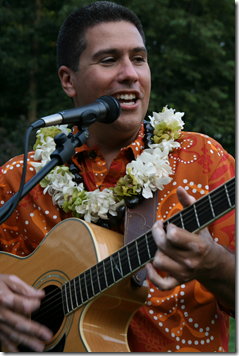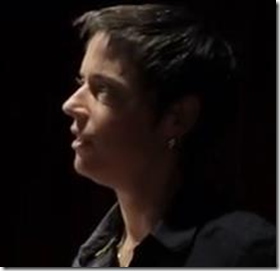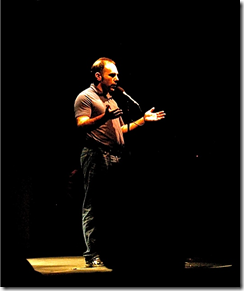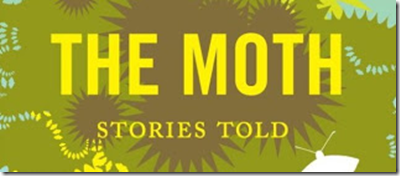On Tuesday night I told a story at a Moth StorySLAM at Housing Works in New York City and was fortunate enough to win.
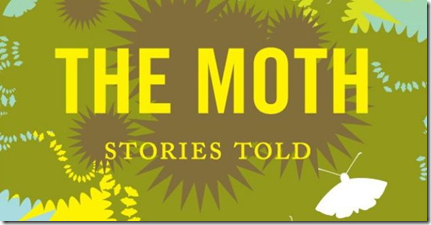
On Facebook and Twitter, I expressed gratitude to my wife for the role she played in helping me to craft the story. A lot of people responded with questions like “How does that work?” and “What did she do to help?” and “Did you perform for her in the living room?”
They were genuinely curious about how we collaborate on projects like this, so I thought I’d explain a little bit about how Elysha and I work.
Let me begin by saying that I am fortunate to have someone as involved in my creative life as my wife. My friend, Kim, has always said that the most important decision you will ever make in life is your choice of spouse.
She couldn’t be more correct. Not only is Elysha willing to be involved, but she is skilled and intelligent in her approach to creativity, too. So much of my success is the result of her influence on my work.
I have won a total of 5 Moth StorySLAMs during my two years of storytelling, and Elysha has been involved in 4 of those victories (and many, many second place finishes). In one instance, she actually convinced me to change the story I was planning to tell about five hours before the show. I thought she was crazy, but she was adamant. After some moments of indecision, I took her advice and prepared an entirely different story during my lunch break.
And I won. It was probably the best story I’ve ever told.
I’ve learned to listen to m wide whenever possible.
The theme of Tuesday’s StorySLAM was Summer. My story was about a doomed romance during the summer of 1993.
I didn’t perform the story for Elysha in the truest sense of the word because I don’t memorize my stories. They are always true stories from my own life, so I don’t worry about getting lost or mixed-up during my performance. I actually did these things, so I should damn well remember what happened.
I also like the organic nature of storytelling that comes from a story that is not memorized or overly prepared. It allows me to make adjustments on stage, pushing or pulling back on certain aspects of the story based up audience reaction. If the humor isn’t playing well, I can shift to the heart. If the audience thinks I’m hilarious, I can take some risks and push the humor even more.
In at least two instances, I found entirely different and much better endings to my stories in the midst of telling them. In one case, I returned to my seat and Elysha asked if I’d been keeping the real ending to the story a secret from her for some reason.
“No,” I said. “I found it while I was up there.”
At another non-Moth performance, I found a way of turning a sad ending into a funny one. The producer of the show, who had vetted my story beforehand and knew it well, was backstage and not really listening to my performance. When the audience erupted into laughter and I turned to leave the stage, she asked, “What happened?”
“I found a better ending,” I told her.
Had I relied on memorization, I don’t think either of these moments of unexpected discovery could’ve happened.
As a result, every time I tell a story, it sounds a little different, so performing for Elysha in the living room would be silly and unproductive.
It would make me feel silly, too.
But even without memorization, I do have some strategies to get me through the story:
- I find important transition points in stories and memorize those specific sentences so I have stepping stones to the end.
- I find moments of potential humor and try to find the funniest way of delivering those lines.
- I memorize my first 2-3 sentences of my story.
- I try to memorize my last line of my story, though that last line often changes while onstage.
I don’t write my stories down anymore, and I don’t time them before the performance. Writing them down has become unnecessary. If I simply run through the story in my mind dozens of times and consistently hit those stepping stones, I’m much better prepared than if I had a sheet of paper in front of me.
The Moth’s 5 minute time limit stressed me out when I started telling stories, but after two years, I’ve developed an innate sense of what a 5 minute story sounds like, and since I don’t memorize the story, I can always edit the story if needed once I receive the first warning bell.
I do almost all my thinking about my stories in the shower now. It sounds crazy, but it’s where I do my best work. It takes about a week’s worth of showering to finalize my story in my mind, and only then do I tell Elysha the story, usually while I am driving.
It makes me feel less self-conscious than simply staring at her and telling the story at the kitchen table.
But rather than telling her the story, I speak about the story aloud. I start to tell the story, usually getting through the first few lines, but then I stop in order to explain what I’m trying to achieve with a specific line or bit of detail, and I ask her to think about whether or not it’s working. Or she stops me to ask a question or comment on something. I think through my story as I tell it to her, including her on the internal debates I’ve been having over how to deliver a line, how to transition through time or space, and what to add or remove. I rarely tell her the story straight through.
Instead, I tell and we talk. Stop-and-go. Simultaneously.
Elysha doesn’t hold back. She doesn’t attempt to be gentle. She doesn’t equivocate. Her comments are often pointed and opinionated. It hurts, but it helps. It's tough medicine.
All of the work we did for Tuesday’s story was done in the car during our 3 hour drive to the city. Until we climbed into the car, she had almost no idea about the story I planned to tell.
Elysha eliminated two sections of detail in the beginning of the story that were unnecessary and slowed things down. I was overly attached to one section because it represented a bit of personal suffering, but it wasn’t needed. A woe-is-me moment.
I thought the other section was funny. She disagreed.
Ironically, Elysha almost never laughs at any of my stories while we are working on them. Based upon her initial reactions, none of my stories are amusing in any way. She may say that something is funny, but the actual laugh does not come until I am performing onstage.
This can be disconcerting, but I’ve learned to accept it.
She also identified two key lines in the story and transformed them into stepping stones for me. One line summarized my thoughts on an issue succinctly, and she thought the other was both insightful and funny. She thought both lines were important and should not be dropped, so I committed them to memory.
She also found the all-important last sentence of the story, which I had been struggling with all week. Much of storytelling is decision-making. What to tell and what to leave out?
In this case, the question as where to end my story.
Do I end my story here, or do I tell my audience about what happened during the following week as well? Or the following month?
I ran through the ending several times with her, trying a variety of approaches, and when finally I hit upon the right line, she knew it immediately. “That’s it,” she said. “That’s the last line. Stop there.”
She was right.
She also identified areas where I could emphasize the theme of the night better. In truth, she tried to convince me to change my story completely. Since I spent most of my childhood summers at Boy Scout camp, she didn’t understand why I hadn’t chosen any of the dozens of stories I have from my years at Yawgoog Scout Reservation. I went so far as to tell her one of my camp stories in the car and nearly switched to it before deciding to stick to my guns and tell the story that I had prepared.
In this case, I was right and she was wrong. This almost never happens.
These minor changes made an enormous difference in my story. They allowed me to maintain momentum onstage. They kept the story focused on only those elements that were important to the narrative. They eliminated unfunny bits that would’ve fallen flat. They kept the story under the 5 minute time limit without the need for any onstage editing.
Most important, she helped me end my story at just the right moment.
That, in considerably less than a nutshell, is how we work.
Had Elysha been here when I wrote this post, I’m sure she could’ve made it better, too.

